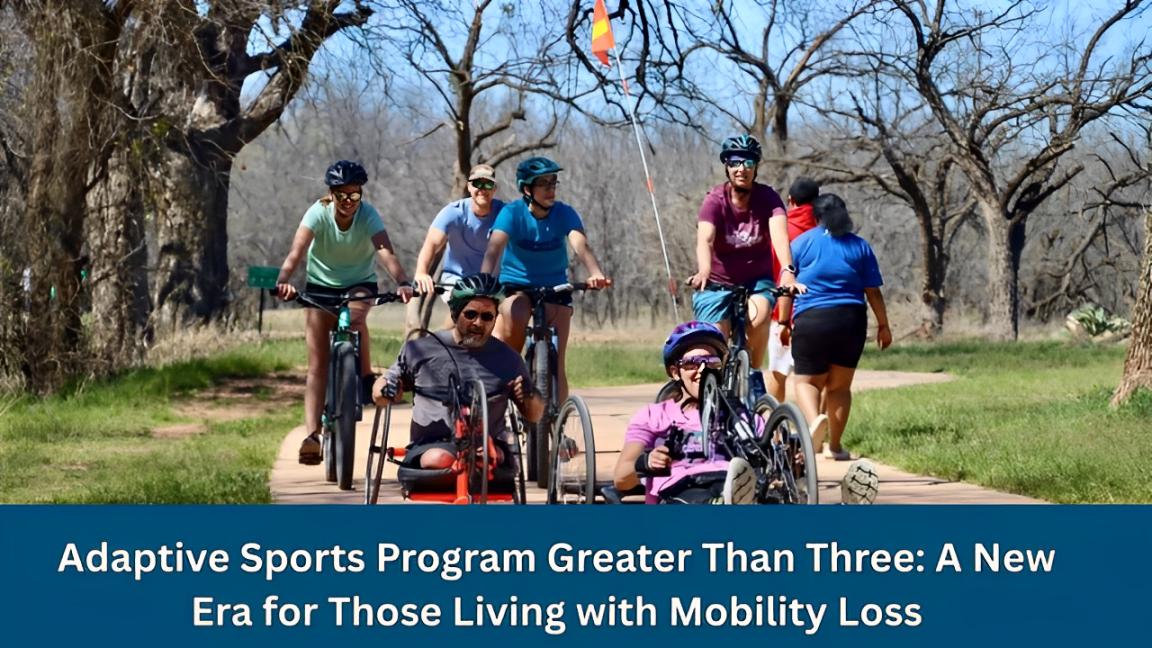Hedi Wachtel’s life changed in a moment. After a spinal cord injury left her with less than a three percent chance of moving anything below her neck, doctors painted a grim picture. But Hedi had other plans. She defied the odds, regaining movement in her arms and parts of her legs through determination and rigorous physical therapy.
Her recovery, though remarkable, didn’t stop at her personal journey. It inspired her to create Greater Than Three, a groundbreaking adaptive sports program designed for individuals with mobility challenges, particularly those dealing with spinal cord injuries and limb loss.
The Vision Behind Greater Than Three
The name “Greater Than Three” comes from Hedi’s personal experience. Initially, doctors told her there was less than a three percent chance she would ever move again. However, she proved them wrong. The foundation of Greater Than Three rests on the philosophy that no number should define someone’s ability to live an active, meaningful life. The goal is simple: to empower individuals with mobility loss to achieve their full potential through adaptive sports and to help them reclaim the joy of movement.
Greater Than Three serves as a reminder that determination, resilience, and hope can overcome even the most daunting odds. It is not just a program; it’s a movement that seeks to break barriers and change perceptions around disability, sports, and mobility.
Providing Opportunities for All
One of the most significant aspects of Greater Than Three is the variety of events it offers to its participants. Monthly activities like pickleball, cycling, and other adaptive sports provide an opportunity for individuals who are affected by mobility loss to stay active, socialize, and thrive in an inclusive environment.
Each of these sports is adapted to meet the needs of people with varying levels of mobility. For instance, adaptive pickleball involves specialised equipment, such as paddles with more grip or chairs designed for stability, to help those in wheelchairs or with limited movement engage fully in the game.
Similarly, adaptive cycling includes hand cycles or modified bikes, making it possible for people who cannot use their legs to enjoy the thrill of cycling still and participate in community rides. These events offer participants not only physical exercise but also a sense of connection, making the community stronger and more supportive.
Changing Societal Perceptions
Greater Than Three is determined to shatter stereotypes about disability and physical activity. Many people still believe that individuals with mobility impairments cannot or should not participate in sports, but Greater Than Three challenges that thinking by proving that with the right equipment and support, everyone can engage in and enjoy sports, regardless of their physical limitations.
Hedi, a former Division 1 athlete and ultra-marathon runner, shares her perspective: “Losing my ability to do sports after my injury felt like losing a part of myself. Regaining that, even in a modified form, has been life-changing, not just for me but for many others who feel they’ve lost their connection to the world of sports. It’s about reclaiming that world, showing people it still exists, and making it available to them.”
The organisation’s core message is clear: no one should be limited by their physical abilities when it comes to having fun, being active, or participating in sports.
Addressing the Financial Challenge of Adaptive Equipment
While the program’s impact on participants is powerful, there are still significant barriers that need to be addressed. One of the biggest challenges is the cost of adaptive sports equipment. Specialized sports chairs, handcycles, and other equipment necessary for adaptive sports can cost thousands of dollars, often beyond the reach of individuals who are already facing the financial strain that comes with dealing with mobility issues.
Insurance often doesn’t cover the cost of this specialized equipment, which can make it incredibly difficult for people with mobility impairments to participate in sports activities. To address this, Greater Than Three has made fundraising and donation efforts a major part of its mission.
Clint Taylor, a board member of Greater Than Three, highlights the need for community support: “Adaptive equipment is expensive, and that’s why we’re so grateful for initiatives like Abilene Gives. It’s not just about the financial contributions, but also about people donating their time and energy to help support our mission and the larger Greater Than Three community. It’s really about people coming together to make adaptive sports accessible to everyone, regardless of financial constraints.”
Through donations and volunteer efforts, Greater Than Three hopes to make adaptive sports more accessible to those who need them most. The organisation is continually looking for financial backers, volunteers, and partners who believe in adaptive sports’ transformative power.
The Journey Ahead: Expanding Opportunities
Looking toward the future, Hedi and her team have big plans for Greater Than Three. While the organization currently operates from various locations, Hedi hopes to open a dedicated adaptive sports gym. This gym would serve as a hub for individuals with mobility loss, offering access to the equipment they need and a supportive space where they can engage in various adaptive sports. Such a facility would allow Greater Than Three to provide even more tailored support for its participants, helping them further improve their strength, mobility, and overall well-being.
The future goal is not just about expanding the program’s footprint but also about building a sustainable community where people with mobility challenges can feel empowered and supported in their athletic endeavors. The gym would also serve as a resource for people who are new to adaptive sports, providing a safe space to start their fitness journeys and connect with others who have similar experiences.
A Call for Volunteers and Donations
Greater Than Three is in its infancy, but it has already touched the lives of many individuals. However, to truly make a lasting impact, the organization relies on the generosity of donors, volunteers, and advocates. The greater the involvement from the community, the bigger the impact the program can have on those with mobility challenges.
Volunteers are vital to the success of Greater Than Three. Volunteers help with event organization, provide hands-on assistance with equipment, and serve as mentors to participants. As Clint Taylor mentions, it’s not just about money; it’s also about donating time and being an active part of the community.
The program is also looking for donors to help fund the purchase of new equipment. Hand cycles, adaptive wheelchairs, and specialised sports equipment are costly, and Greater Than Three is working tirelessly to raise funds to make these items accessible to everyone who needs them.
Anyone who is interested in contributing to the cause can visit Greater Than Three’s website to learn more about how to donate or volunteer. No contribution is too small, and every bit helps to further the organization’s mission of empowering individuals to live active, fulfilling lives.
Empowering Lives, One Event at a Time
In conclusion, Greater Than Three is more than just a sports program. It’s an empowerment movement aimed at helping individuals with mobility loss regain their independence and passion for physical activity. Through adaptive sports, Greater Than Three provides a platform where people can rediscover the joys of movement, break down societal barriers, and form connections that last a lifetime.
The program’s focus on inclusivity and accessibility ensures that no one is left behind, regardless of their mobility challenges. With the support of donors, volunteers, and community members, Greater Than Three can continue to grow, expanding opportunities for individuals with mobility loss to engage in sports, live actively, and thrive.
If you’re looking to make a difference, consider supporting Greater Than Three. Whether through a donation, volunteering your time, or simply spreading the word about the organisation, you can be part of this life-changing movement.

Deepak Grover is a dedicated content writer at OTE News, specializing in government affairs, public policy, and current events. With a keen eye for detail and a passion for factual reporting, he ensures readers receive accurate and insightful news. Deepak holds a degree in Political Science and has experience in research-driven journalism.
When not writing, he enjoys reading historical books, exploring hiking trails, and staying updated with global political trends. His commitment to ethical journalism makes him a trusted voice at OTE News.




